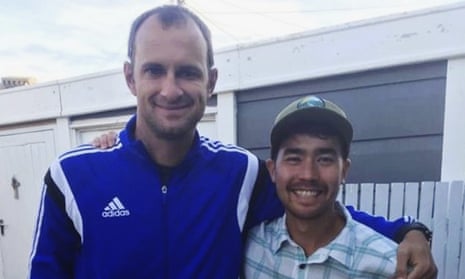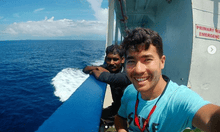An American man who was killed by an isolated tribe on a remote Indian island wrote to his parents hours before his death that he wanted to “declare Jesus” to the tribespeople and that they should “not be angry at them or at God if I get killed”.
John Allen Chau, 26, is believed to have been hit with a volley of arrows shortly after making land on North Sentinel Island, part of the Andaman and Nicobar Islands, last Friday.
The island, which is off-limits to visitors without permission, is home to a 30,000-year-old tribe that is known to aggressively resist outsiders.
Chau repeatedly tried to contact the tribespeople and managed to reach the island the day before he was killed. He tried to offer gifts of fish and a football, he wrote in his diary.
“I heard the whoops and shouts from the hunt,” Chau wrote in an entry that was given to several media outlets by his mother. “I made sure to stay out of arrow range, but unfortunately that meant I was also out of good hearing range.
“So I got a little closer as they (about six from what I could see) yelled at me, I tried to parrot their words back to them. They burst out laughing most of the time, so they probably were saying bad words or insulting me.
“I hollered: ‘My name is John, I love you and Jesus loves you.’ I regret I began to panic slightly as I saw them string arrows in their bows. I picked up the fish and threw it towards them. They kept coming.
“I paddled like I never have in my life back to the boat. I felt some fear but mainly was disappointed. They didn’t accept me right away.”
One of the tribespeople – “a kid probably about 10 or so years old, maybe a teenager” – fired an arrow that struck his Bible, he wrote that night, onboard the boat of fishermen he paid 25,000 rupees (£275) to smuggle him close to the island. “Well, I’ve been shot by the Sentinelese.”
The next day as he prepared to make another approach, Chau wrote a letter to his parents. “You guys might think I’m crazy in all this, but I think it’s worth it to declare Jesus to these people,” he wrote.
“Please do not be angry at them or at God if I get killed. Rather, please live your lives in obedience to whatever he has called you to and I’ll see you again when you pass through the veil.
“This is not a pointless thing. The eternal lives of this tribe is at hand and I can’t wait to see them around the throne of God worshipping in their own language, as Revelations 7:9-10 states.”
He signed off: “Soli deo gloria” (glory to God alone).

But his diaries revealed less certainty about the mission he was undertaking. “If you want me to get actually shot or even killed with an arrow, then so be it,” he wrote, addressing God. “I think I could be more useful alive though.
“I don’t want to die. Would it be wiser to leave and let someone else continue? No. I don’t think so. I still could make it back to the US somehow, as it almost seems like certain death to stay here.”
He gave the diary and letter to the fishermen and took a kayak back to the island. The next morning, according to a police statement, “the fishermen saw a dead person being buried at the shore which from the silhouette of the body, clothing and circumstances appeared to be the body of John Allen Chau”.
Seven people including five fishermen have been arrested for helping Chau reach the island. The Indian government recently lifted a ban on tourists going there, but Denis Giles, an activist for tribal rights in the Andamans, said state authorities still asked people to seek permission, and the status of the island was “a grey area”.
Police said Chau had visited the Andamans, which are scattered across the juncture of the Bay of Bengal and the Andaman Sea, four times in the past three years.
His family posted on his Instagram on Wednesday that they forgave his killers and asked for those who helped him to be released. They said Chau was a “beloved son, brother and uncle” as well as a Christian missionary.
“He loved God, life, helping those in need, and had nothing but love for the Sentinelese people,” the family said. “We forgive those reportedly responsible for his death.”
This article includes content provided by Instagram. We ask for your permission before anything is loaded, as they may be using cookies and other technologies. To view this content, click 'Allow and continue'.
The Sentinelese are estimated to number about 100 and are the most isolated of the four tribes native to the Andamans.
British colonists kidnapped four members of the tribe in the 19th century and Indian anthropologists managed to make limited contact with the community starting in 1967, but for the past 25 years the group has been isolated from the outside world.
Members of the tribe fired arrows at Indian government helicopters that passed over the island after the 2004 Indian Ocean tsunami, and again in February 2006 after two fishermen were killed by the tribespeople when their boat became unmoored at night and drifted to the shore.
Indian authorities said it would take “some days” to recover Chau’s body. Dependra Pathak, the head of the region’s police, told Agence France-Presse that a helicopter and a ship had been sent to the area to identify where he might be buried.
“We maintained a distance from the island and have not yet been able to spot the body,” Pathak said. “It may take some more days.”
The recovery effort involved anthropologists and tribal welfare and forestry officers, he said. “We have to take care that we must not disturb [the Sentinelese] or their habitat by any means. It is a highly sensitive zone and it will take some time,” Pathak added.




